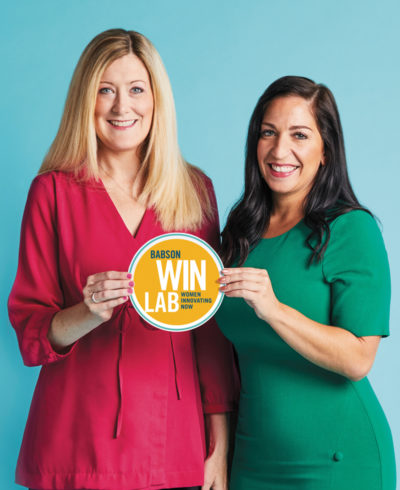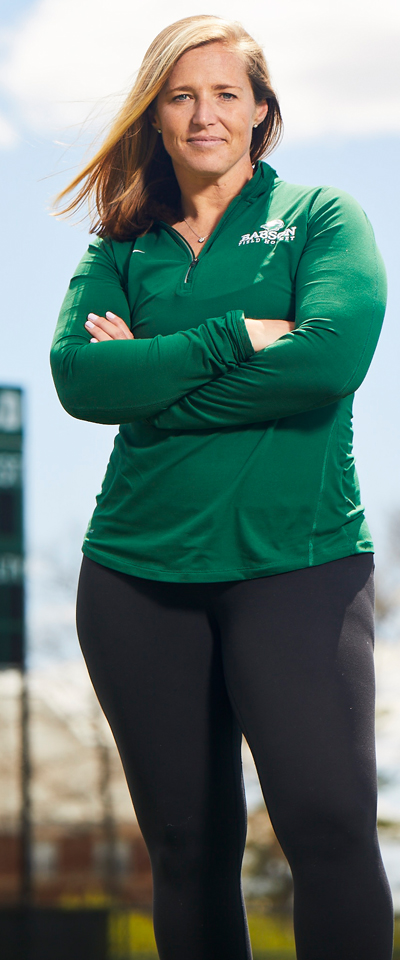
Kara Miller and Michelle Abbs
Photo: Pat Piasecki
Kara Miller
Why is WIN so important?
WIN creates a pipeline of high-growth women entrepreneurs by providing resources that will allow them to grow faster. Currently, less than 3 percent of venture capital dollars go to women entrepreneurs, and when we launched the program, women held only 13 percent of the seats in top accelerator programs. The WIN Lab in Boston is made up of Babson undergrads, graduate students, and alumnae. About one-third of the cohort are women from the broader entrepreneurial ecosystem in Boston.
What are you looking for in these companies?
We’re looking for women entrepreneurs who are thinking big and want to grow large, scalable ventures. One example is Mighty Well, a team of three Babson alumni who started the company in their dorm room when they were undergraduates. Mighty Well creates PICC (peripherally inserted central catheter) covers and other devices for people undergoing medical treatment. Co-founders Emily Levy ’16 and Maria del Mar Gomez ’16 won the Draper Competition, an undergraduate competition for women entrepreneurs, in 2016. Quite a few women have raised funds—more than $13 million between the Boston and Miami labs—and have appeared on shows like “Shark Tank.”
Why do you love this job? Why is it a good fit for you?
I love working with entrepreneurs who are passionate, innovative, and dedicated to what they do. And I find it so incredibly inspiring and rewarding to be part of their entrepreneurial journey and help them identify the resources they need to scale and grow and reach their dreams. From the start of the program, we work with all the “WINners” to identify the goals they’re looking to reach by the end of the program. We help them achieve those goals through the WIN curriculum, network, and coaches who provide expertise. Watching people’s visions come to life is amazing. My job gives me the opportunity to be part of that journey as the entrepreneurs tackle challenges, overcome obstacles, continue to meet milestones, and make strides along the way.
Michelle Abbs
Why is there a WIN Lab in Miami?
The WIN Lab started here four years ago. We were the first Babson presence in Miami programmatically and came because Miami is the College’s fourth-largest alumni area in the world. Some members in our first cohort were Babson alumnae, but the majority of the participants were community members, so WIN was their first exposure to Babson. I think it’s a very unique program offering, different from the ecosystems in Boston or San Francisco where our names might be more well-known.
What makes this job so interesting for you, and what would you like people to know about what you do?
People ask why we need a program for women entrepreneurs. Here’s the reality: Women face unique challenges in entrepreneurship that men will never experience, period. Whether it’s gaining access to capital, managing expansion while underfunded, or being left out of networks, these hurdles are very real, and I see the impact of this kind of gender bias every day. I’m fueled by the idea that we can make a significant difference in the lives of the entrepreneurs who join the WIN Lab and its surrounding networks. We have a long way to go to change the headlines appearing today, but I am inspired to work hard for the fierce, relentless women who are determined to defy the odds instead of being discouraged by the statistics.
Why do you think you’re such a good fit for this job? Why do you love it?
I’m an educator at heart, and seeing the lightbulb moments from our entrepreneurs really lights me up inside. When participants come into the program, they feel like they don’t know how to do something—or they can’t do something as well as they would like to do it. Then, by the end of the program, they’re completely transformed. That gives me so much energy and inspiration. – Kara Baskin

Julie Ryan
Photo: Pat Piasecki
Why was Babson a good fit for you after coaching Division I at Yale and Boston College?
There is a lot of pressure on the student-athletes at the Division I level. Over the last 12 years, I’ve lived the Division III experience, and I truly believe it gives the students the best opportunity to do more than play their sport. They have an incredible amount of balance in their lives, which is an important life skill.
You have an impressive history as an athlete; what was it about coaching that appealed to you?
I think the skills and the experience that collegiate athletics provided were something that I couldn’t imagine not having in my life. When I realized that the opportunity to coach was something viable and realistic for me, I jumped at it. I honestly couldn’t imagine doing anything else.
How does your job as an athletic coach fit into students’ lives at Babson, and beyond?
Our role as coaches is to make sure that we are allowing an opportunity for growth, and to make sure students are prepared for life’s challenges when they leave here. I think Babson does a great job of that academically, but to reinforce that through athletics sets this experience so high on the bar.
You stay in touch with many of the students you’ve coached. Why are these relationships important?
One of my favorite nights of the year is when I invite all the alums I’ve coached to my house for dinner with the team. They tell stories and connect with the current team, which gives them an opportunity to hear about the legacy they’re leaving and truly embrace the experience. I love being part of their growth at Babson, but I am most proud of the impact they make when they leave here. – Jeannine Stein